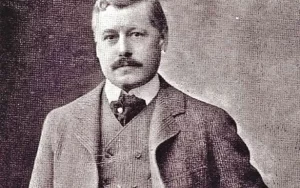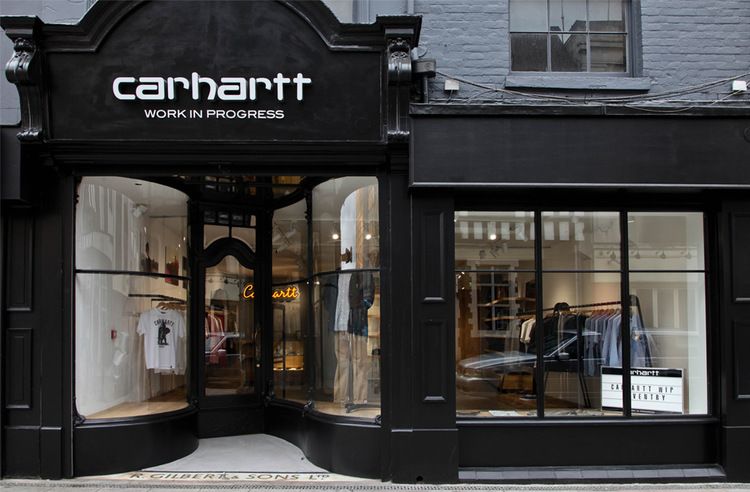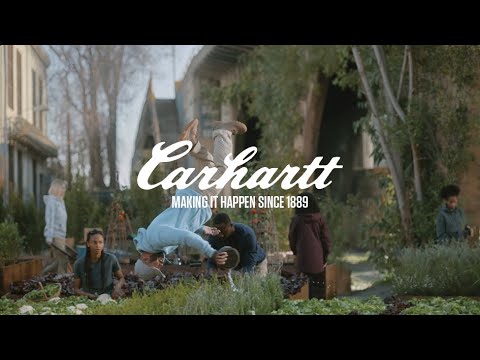Carhartt, a name synonymous with rugged durability and unwavering dedication to hardworking individuals, has been a cornerstone of American workwear since its inception in 1889. Founded by Hamilton Carhartt, a man deeply committed to providing workers with clothing that could withstand the rigors of their demanding jobs, Carhartt has consistently delivered apparel that embodies both functionality and resilience.
The Genesis of Carhartt: A Legacy of Hard Work and Innovation
Carhartt’s origins can be traced back to Detroit, Michigan, where Hamilton Carhartt, an immigrant from England, established his company with a simple yet profound mission: to provide “honest value for an honest dollar.” Armed with two sewing machines and a team of five employees, Carhartt embarked on a journey to revolutionize workwear.

Driven by a keen understanding of the needs of manual laborers, Carhartt sought inspiration from the very people he aimed to serve. He actively engaged with railroad workers, listening to their concerns and observing their struggles with ill-fitting, poorly constructed garments. This firsthand exposure to the challenges faced by working-class individuals fueled Carhartt’s determination to craft workwear that would not only endure but also enhance the lives of those who wore it.
- Number of stores: Over 80 stores worldwide
Unwavering Commitment to Quality and Durability
From the outset, Carhartt was uncompromising in his pursuit of quality. He carefully selected materials, prioritizing durability and functionality above all else. His signature duck canvas, a tightly woven cotton fabric, quickly became synonymous with Carhartt’s brand, renowned for its resistance to abrasion, tearing, and the harsh conditions faced by workers on a daily basis.
Carhartt’s dedication to quality extended beyond materials to encompass design and construction. His garments were meticulously crafted with reinforced seams, strategically placed pockets, and ample movement for unrestricted activity. Every stitch, every rivet, every element of Carhartt’s workwear was thoughtfully designed to withstand the demands of the job site, ensuring that workers could focus on their tasks without worrying about their clothing.
A Symbol of American Ingenuity and Work Ethic
As Carhartt’s reputation grew, so did its reach. The company expanded beyond Detroit, establishing factories across the United States and eventually venturing into international markets. Throughout its expansion, Carhartt remained true to its core values, prioritizing quality, durability, and the needs of hardworking individuals.
Carhartt’s workwear became an integral part of American culture, a symbol of ingenuity, resilience, and the unwavering work ethic that has shaped the nation. Its iconic jackets, overalls, and vests were adopted by generations of workers, from farmers and construction workers to mechanics and oil rig operators. Carhartt’s garments became more than just apparel; they transformed into badges of honor, signifying dedication, hard work, and the pride of those who wore them.
Today, Carhartt stands as a testament to the enduring power of quality, innovation, and unwavering commitment to the people who drive the world forward. Its workwear remains the go-to choice for hardworking individuals across industries and continents, a symbol of the brand’s enduring legacy. Carhartt’s impact extends beyond the realm of apparel; it has become a cultural icon, a symbol of the American spirit, and a reminder of the power of hard work and dedication.
Marketing Strategies of Carhartt
Carhartt has not only weathered the test of time but has also become synonymous with durability, quality, and reliability. Behind its success lies a carefully crafted set of marketing strategies that have propelled the brand to the forefront of the industry.
1. Authentic Brand Positioning
Brand Positioning is a marketing strategy employed by Carhartt to create a unique and distinctive image for its brand in the minds of its target audience. This involves identifying and communicating a specific benefit or value proposition that sets Carhartt apart from its competitors and makes it more appealing to its desired customers. By doing so, Carhartt aims to occupy a specific niche in the market and establish a strong brand identity that resonates with its target audience.
An example of Carhartt’s brand positioning is its “Make it happen” campaign. “Make it Happen” is a campaign by Carhartt that celebrates the hard work of their community. The campaign also honors the brand’s history and looks forward to the future of hard work. The campaign ran on Carhartt’s website and connected and streaming TV. The campaign features real-life customers who have worn Carhartt clothing for years, sharing their stories of how the brand’s products have stood the test of time and continued to deliver exceptional results.
By focusing on durability and reliability, Carhartt positions itself as a brand that offers long-lasting solutions for hardworking individuals who need clothing that can keep up with their demands. This messaging resonates with Carhartt’s target audience, creating a strong emotional connection between the brand and its customers.
2. Understanding the Target Audience
Target Audience is a marketing strategy that Carhartt employs to identify and understand its ideal customer segment. The brand recognizes that not everyone is a perfect fit for its products, and therefore, it aims to target those who are most likely to appreciate the quality, durability, and comfort offered by Carhartt. By defining its target audience, Carhartt can tailor its marketing messages, product offerings, and distribution channels to better serve this group, increasing the likelihood of conversion and brand loyalty.
Carhartt’s target audience primarily consists of hardworking individuals who require durable and comfortable clothing for their daily activities. This includes construction workers, farmers, ranchers, and outdoor enthusiasts who value quality and durability over flashy designs and cheap prices. These individuals are willing to invest in clothing that can withstand the rigors of their work and provide them with the comfort they need to perform at their best. By targeting this specific audience, Carhartt can focus its marketing efforts on reaching these individuals and providing them with the products and services that meet their unique needs.
3. Digital Dominance
Digital Dominance is a marketing strategy employed by Carhartt to establish a strong online presence and leverage digital channels to reach its target audience. The brand recognizes that an increasing number of consumers are turning to online platforms to research, compare, and purchase products. Therefore, Carhartt aims to create a dominant presence across various digital touchpoints, such as search engines, social media, email marketing, and e-commerce websites. By doing so, the brand can maximize its visibility, engagement, and conversions among its target audience.
A recent example of Carhartt’s Digital Dominance strategy is its use of influencer marketing on social media platforms. These influencers share their personal experiences and adventures while wearing Carhartt clothing, showcasing the brand’s durability, comfort, and versatility. Their followers, who are largely comprised of Carhartt’s target audience, are able to relate to these influencers and see the value in the products they promote. As a result, Carhartt has increased its brand awareness, engagement, and website traffic through this targeted and authentic form of marketing.
4. Compelling Content Marketing
Content marketing is a fundamental aspect of Carhartt’s marketing strategy, enabling the brand to connect with its target audience and establish itself as a respected authority in the workwear sector. By combining storytelling, product demonstrations, and industry insights, Carhartt develops engaging and informative content that resonates with hardworking individuals and strengthens its brand values of durability, authenticity, and commitment to the working class.
Carhartt’s “Make It Happen” campaign, which emphasizes the brand’s dedication to delivering robust and dependable workwear for those who operate in the most demanding environments, is an illustration of the company’s successful content marketing initiatives. The campaign features tales of genuine workers who rely on Carhartt equipment to accomplish their demanding tasks, demonstrating the brand’s capacity to comprehend and meet the requirements of its target audience. By sharing these genuine narratives, Carhartt not only promotes its products but also forges a connection with its audience based on common values and experiences.
Another effective example of Carhartt’s content marketing strategy is its “Friends of Carhartt” program. This program involves a network of workers who contribute to the company’s research and testing, as well as serve as influencers and models. Anyone featured in Carhartt’s marketing and communications must be a genuine worker, and the “History in the Making” campaign filmed real-life people performing their real-life jobs. While the company does engage in some paid social media, it primarily relies on organic marketing through this network of workers.
By prioritizing authentic storytelling and real-life experiences, Carhartt’s content marketing strategy effectively connects with its target audience, fostering brand loyalty and driving customer engagement.
5. Strategic Product Placement
Carhartt’s rugged and durable apparel has been featured in a wide range of popular media, from blockbuster films to critically acclaimed television series. This exposure has allowed the brand to connect with a diverse audience, reinforcing its reputation for quality and authenticity.
Notable Examples of Carhartt’s Product Placement
- The Departed (2006): In this Martin Scorsese-directed crime thriller, Carhartt jackets are prominently worn by both the police and the mob, subtly reinforcing the brand’s association with both toughness and authority.

- The Fast and the Furious franchise: Throughout the action-packed Fast and Furious films, Carhartt workwear is frequently seen on the characters, often in high-pressure situations that underscore the brand’s durability and functionality.

- Sons of Anarchy (2008-2014): In this gritty FX drama about an outlaw motorcycle club, Carhartt jackets and vests are a staple among the characters, further solidifying the brand’s connection to the working class and rugged lifestyles.
- Duck Dynasty (2011-2017): This reality series about a family of Louisiana duck hunters featured Carhartt products extensively, aligning the brand with the show’s themes of family, hard work, and Southern values.
- Yellowstone (2018-present): In this modern-day Western drama, Carhartt apparel is frequently seen on the characters, fitting seamlessly with the show’s rugged setting and themes of cowboys and ranch life.
Carhartt’s strategic product placement has proven to be a highly effective marketing tool, allowing the brand to reach a broad audience and strengthen its brand image. By associating its products with popular media and relatable characters, Carhartt has successfully positioned itself as an authentic and dependable brand that resonates with hardworking individuals across various lifestyles.
In addition to enhancing brand awareness and perception, Carhartt’s product placement has also directly influenced consumer behavior. Studies have shown that product placement can lead to increased brand recall, positive brand associations, and even purchase intent. In the case of Carhartt, product placement has contributed to the brand’s enduring popularity and consistent sales growth.
6. Retail Excellence
Carhartt has established a reputation for not only providing high-quality products but also delivering exceptional retail experiences. Retail excellence is a cornerstone of Carhartt’s marketing strategy, enabling the brand to connect with its target audience and foster brand loyalty.
Carhartt’s commitment to retail excellence is evident in several key aspects of its retail operations:
-
Store Design and Layout: Carhartt stores are designed to reflect the brand’s rugged and authentic image, featuring exposed brick walls, industrial lighting, and ample space for product display. The layout is organized to make it easy for customers to find what they are looking for, with clear signage and helpful staff readily available.

-
Visual Merchandising: Carhartt’s visual merchandising strategies effectively showcase the brand’s products and create a compelling shopping experience. Eye-catching displays, mannequins dressed in workwear outfits, and lifestyle imagery reinforce the brand’s association with hard work, durability, and authenticity.
-
Customer Service: Carhartt’s employees are known for their friendly and knowledgeable service, providing customers with personalized assistance and product recommendations. The company emphasizes training and development to ensure that its staff is well-equipped to meet the needs of its customers.
-
Omnichannel Retailing: Carhartt has successfully integrated its physical stores with its online presence, offering a seamless omnichannel retail experience. Customers can easily browse and purchase products online, check inventory availability in stores, and return or exchange items conveniently.
Examples of Carhartt’s Retail Excellence Practices
-
Carhartt Flagship Stores: Carhartt’s flagship stores are designed to be immersive experiences, showcasing the brand’s heritage and connection to the working class. The Detroit flagship store features a museum showcasing the brand’s history, while the New York City flagship store hosts events and workshops for local workers.
-
Carhartt Workwear Tours: Carhartt invites customers behind the scenes of its factories and distribution centers, providing an opportunity to see firsthand the craftsmanship and dedication that go into making its products. These tours reinforce the brand’s commitment to quality and authenticity.
-
Carhartt Community Events: Carhartt actively participates in community events and sponsorships, such as local fairs, trade shows, and sporting events. These engagements allow the brand to connect with its target audience and build relationships with potential customers.
The Impact of Carhartt’s Retail Excellence Strategy
Carhartt’s focus on retail excellence has significantly impacted its brand perception and customer loyalty. By creating a positive and engaging shopping experience, Carhartt has attracted new customers, encouraged repeat purchases, and fostered brand advocacy.
Moreover, Carhartt’s retail excellence practices have contributed to its financial success. The company’s physical stores serve as valuable touchpoints with customers, generating a significant portion of its revenue. Additionally, the seamless omnichannel experience has made it easier for customers to purchase Carhartt products, further boosting sales.
7. Customer Loyalty Programs
Carhartt has effectively leveraged customer loyalty programs to strengthen its connection with its target audience and foster brand loyalty. The company’s Groundbreakers Loyalty Program, introduced in 2008, has become a key component of its marketing strategy, providing a platform to reward its hardworking customers and enhance their engagement with the brand.
The Groundbreakers Loyalty Program: A Comprehensive Rewards System
The Groundbreakers Loyalty Program is a free program that allows customers to earn points on qualifying purchases made at Carhartt.com or in Carhartt Company Stores. These points can be redeemed for a variety of rewards, including discounts, merchandise, and exclusive experiences.
Key Features of the Groundbreakers Loyalty Program:
-
Earn $5 on every $100 purchase: Customers earn $5 point for every $100 spent on qualifying purchases.
-
Earn exclusive rewards: Customers can earn exclusive rewards, such as merchandise, access to special events, and personalized offers.
-
Enjoy early access to sales: Groundbreakers members receive early access to Carhartt sales and promotions.
-
Free shipping on orders over carhartt.com: Groundbreakers members receive free shipping on orders over carhartt.com .

Carhartt’s Groundbreakers Loyalty Program exemplifies the power of customer loyalty programs in fostering brand loyalty and driving business growth. By recognizing and rewarding the dedication of its hardworking customers, Carhartt has successfully strengthened its brand image and established a loyal customer base. The program serves as a blueprint for other brands seeking to enhance customer engagement and achieve sustainable success.
Carhartt’s success is not merely a result of producing quality workwear; it’s a testament to a comprehensive and well-executed marketing strategy. By authentically connecting with its audience, leveraging digital platforms, and staying true to its core values, Carhartt continues to carve its path in the competitive world of workwear fashion.
Marketing Mix of Carhartt
The marketing mix, often referred to as the 4Ps (Product, Price, Place, and Promotion), is a set of marketing tools that companies use to pursue their marketing objectives in the target market. Let’s delve into each element of the marketing mix in the context of Carhartt:
1. Product
- Durable Workwear
Carhartt is renowned for its durable workwear, designed to withstand demanding conditions in industries such as construction, agriculture, and manufacturing. Products include outerwear, shirts, pants, and accessories, all characterized by high-quality materials and construction.
- Innovation and Variety:
Carhartt consistently introduces innovative features and materials in its products, staying at the forefront of workwear technology. The product line has expanded to include not only traditional workwear but also casual wear, ensuring a broader market appeal.
- Iconic Designs
The brand’s iconic designs, such as the duck canvas material, have become synonymous with rugged durability. Carhartt’s products often feature distinctive design elements that contribute to brand recognition.
2. Price
- Premium Pricing Strategy:
Carhartt positions itself as a premium brand, justifying higher prices through the exceptional quality and durability of its products. The premium pricing strategy contributes to the perceived value of the brand.
- Value Proposition:
While the initial cost may be higher, Carhartt products are marketed as long-term investments, offering a lower total cost of ownership due to their durability and longevity.
3. Place (Distribution)
- Retail Presence:
Carhartt maintains a robust retail presence through company-owned stores and outlets, ensuring a controlled and immersive brand experience. The brand strategically chooses locations to align with its target demographic.
- Third-Party Retailers:
Partnerships with third-party retailers expand Carhartt’s reach, making products accessible in various locations. Selective distribution helps maintain the brand’s exclusivity.
- E-commerce:
The brand’s official website serves as a comprehensive e-commerce platform, providing a direct-to-consumer channel for purchasing Carhartt products. E-commerce enhances accessibility and convenience for customers.
4. Promotion
- Authentic Brand Messaging:
Carhartt’s promotional efforts revolve around authenticity, emphasizing the brand’s heritage, values, and commitment to producing high-quality workwear. Marketing messages highlight the brand’s roots in workwear and its journey through history.
- Digital Marketing:
Active engagement on social media platforms, email campaigns, and the official website showcases Carhartt’s commitment to staying connected with its audience in the digital age. Content includes product showcases, behind-the-scenes looks, and customer testimonials.
- Partnerships and Collaborations:
Carhartt strategically partners with influencers, celebrities, and brands that align with its image, expanding its reach and reinforcing its position in the market. Collaborations contribute to the brand’s cultural relevance and appeal.
- Event Sponsorship:
Carhartt sponsors and participates in events relevant to its target audience, creating opportunities for direct engagement and brand exposure. Event sponsorship aligns the brand with the values and interests of its customers.
Carhartt’s marketing mix is a comprehensive and strategic approach that encompasses not only the core elements of product, price, place, and promotion but also values authenticity, innovation, and customer engagement. The brand’s success lies in its ability to consistently deliver high-quality, durable workwear while effectively communicating its brand story and staying connected with its audience through various channels. Carhartt’s marketing mix reflects a balance between tradition and innovation, creating a brand that resonates with a diverse and loyal customer base in the workwear industry.
Also Read: Marketing Strategies and Marketing Mix of Massimo Dutti
To read more content like this, subscribe to our newsletter





